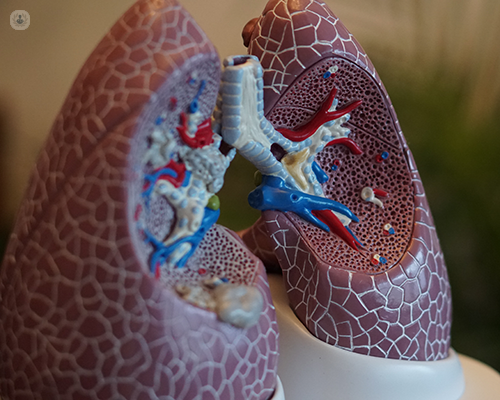Lung cancer symptoms and treatment: When surgery is recommended
Escrito por:Lung cancer is the third most common cancer in the UK, with symptoms often going unnoticed until the condition has progressed. Early detection and treatment are crucial for improving outcomes and enhancing survival rates.
Mr Maninder Kalkat, distinguished consultant cardiothoracic surgeon, provides an expert insight into lung cancer, detailing symptoms and the available treatment options (including surgery).

What are the symptoms of lung cancer?
Lung cancer develops when cells in the lungs begin to grow uncontrollably, forming tumours. As the cancer advances, these tumours may metastasize, spreading to distant organs in the body. There are two main types of lung cancer: non-small cell lung cancer and small cell lung cancer.
In its early stages, lung cancer often doesn’t cause noticeable symptoms, making early diagnosis challenging. When symptoms do present, they may include:
- a persistent cough or a cough that worsens over time
- coughing up blood
- breathing difficulties, such as shortness of breath or wheezing
Additional symptoms include:
- chest pain that intensifies with deep breaths or during coughing
- voice changes, such as hoarseness
- recurring lung infections, like pneumonia or bronchitis
- persistent fatigue and unintentional weight loss
People with a history of smoking, exposure to harmful chemicals, or other risk factors should be vigilant and consult a specialist if they experience any of these warning signs.
When is surgery recommended as a treatment option for lung cancer?
Surgery is a primary treatment option, particularly for early-stage lung cancer, when the tumour is limited to the lungs and nearby lymph nodes and hasn’t spread to other organs. Generally, this is applicable to Stage 1 and Stage 2 lung cancers. In some cases, however, surgery may also be considered for Stage 3 lung cancer.
Before lung cancer surgery, your cardiothoracic surgeon will perform a series of tests, including pulmonary function tests and imaging scans like CT or PET scans, to assess your tolerance for the procedure. Equally, your overall health will also be a critical factor; patients with severe lung disease may not be suitable candidates, as lung cancer surgery often involves removing part of the lung, which may affect lung function after the operation.
What types of lung cancer surgical procedures are available?
Various surgical procedures are available. The choice of procedure will depend on the size, location, and spread of the tumour. The most common lung cancer surgeries include:
Lobectomy
A lobectomy involves the removal of one of the five lobes of the lungs. During the procedure, your cardiothoracic surgeon will make an incision in the chest and remove the lobe containing the tumour, along with nearby lymph nodes. This is the most commonly performed surgery for early-stage non-small cell lung cancer.
Pneumonectomy
A pneumonectomy involves the removal of an entire lung and is a more extensive procedure, typically recommended when the cancer is centrally located in the lung or when multiple lobes are affected. Although it’s possible to live with one lung, it may lead to reduced lung capacity and breathing difficulties. For this reason, this surgery is only considered when absolutely necessary.
Segmentectomy or wedge resection
These procedures involve the removal of a smaller, more localised section of the lung. A segmentectomy removes a portion of the lobe, while a wedge resection removes a triangular section that includes the tumour and a margin of healthy tissue. Typically, these surgeries are considered if lung function is compromised or if the tumour is small and situated in a less critical area.
Sleeve resection
A sleeve resection may be performed when the cancer is located in a central area of the lung, impacting the airways. During the procedure, part of the bronchus (the large air passages leading from the trachea to the lungs) will be removed, and the remaining ends will be reattached.
Will I need additional treatments after surgery?
Surgery alone might not be sufficient for all cases of lung cancer. Depending on the cancer's stage, whether it has spread to the lymph nodes, as well as your overall health, additional cancer treatments may be necessary. These treatments may include:
Chemotherapy
Chemotherapy may be advised after surgery, particularly if the cancer has spread to the lymph nodes or if the tumour was large. This cancer treatment involves using drugs to kill any remaining cancer cells.
Radiotherapy
In some cases, radiotherapy will be used post-surgery to target and destroy any remaining cancer cells in the chest area. Radiotherapy may be utilised alongside chemotherapy, especially for more advanced cases of lung cancer.
Targeted therapy
For patients with specific genetic mutations in their cancer cells, such as EGFR or ALK mutations, targeted therapy may be a viable option. Targeted therapy drugs specifically attack cancer cells based on specific abnormalities without affecting healthy cells.
Each patient’s treatment plan is unique, with decisions made based on individual health, the type of cancer, and other relevant factors. It’s essential to consult with a specialist to determine the most appropriate approach for your situation.
If you would like to book an appointment with Mr Maninder Kalkat, head on over to his Top Doctors profile today.


